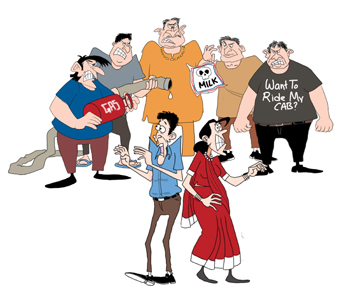A free market is governed by the law of supply and demand. In Nepal we have only the law of demand: unscrupulous businesses demanding the right to cheat consumers

DIWAKAR CHETTRI
There are many everyday indications of the toll that Nepal’s prolonged period of uncertainty is exacting on the people, but perhaps the most glaring is the pervasive
impunity. The six-year transition after the
conflict ended in 2006 is marked by a collapse of governance, a sense that anyone can get away with anything, that money buys power, and might is right.
To be sure, most countries in transition go through a limbo period as the legacy of violence and dictatorship is replaced by democracy, rule of law and an open, stable society. Twenty years after the collapse of the Soviet Union, for example, its many fragments still struggle to come to terms with the criminalisation that the momentous change unleashed.
In Nepal, one could say the transition is needlessly messy and protracted. What we are striving for in the new constitution is an inclusive democracy in which all Nepalis have equal say, opportunities are more equitably distributed, and where there is a system of accountability. We elected an assembly to write that constitution and it failed. We are trying again in November, but the neo-ruling class (including former revolutionaries who promised to liberate the people) can’t agree on the procedures for polls.
Nepal’s transition is characterised by a criminalisation of politics and a politicisation of crime. Smuggling, human trafficking, illegal sand-mining or logging, name any illicit activity in this country and the political leadership has its hands in the honeypot. And the whole machinery is lubricated by payoffs, kickbacks, and corruption.
When a prime minister walks around in broad daylight with a convicted murderer, or one of the most unsavoury characters from our recent past is appointed as corruption watchdog, and war criminals from the army and police are rewarded with promotions, society gets the message that anything goes.
In a country run by a cartel of four political parties, why should it be any surprise to anyone that there are cartels in transportation, gas dealerships, tanker companies, gas stations, sweet shops, water suppliers, the dairy industry, and even gold and bullion traders.
When impunity is rife and regulation feeble, even legitimate businesses engage in profiteering, price-gouging, adulteration, and cheating consumers. And when a weak state tries to crack down on this politico-business nexus, the government is brought to its knees through strikes and forced to roll back on inspections or punishment of frauds.
The interim electoral council’s TOR was to hold elections and it seems to think day-to-day governance is not a part of its mandate. Our bureaucrat ministers say they inherited the problem from the politicians, so let them solve it. That is why when drinking water distributors stopped supplies for four days last week to protest the government’s effort to ensure hygiene and safety, the government quickly capitulated and allowed the suppliers to keep selling contaminated water. When taxi drivers go on strike to be allowed to keep cheating passengers, the state caved in. Tax payers are already footing the bill for subsidised LPG and now the dealers want a bigger cut. Cartels hold the people hostage in just about every sphere of life and the government is powerless to stop it.
Just as democracy has been replaced by a free-for-all, the free market economy has let unscrupulous businessmen do what they want. The open marketplace is supposed to be governed by the laws of supply and demand. Our free market is just governed by the laws of demand: demand from businesses to be allowed to continue cheating the public.
Read also:
Government capitulates
Lost in transition
Let’s face it
Transitional injustice